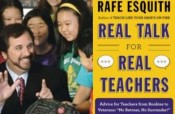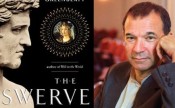Free Forum Q&A – RAFE ESQUITH Multi-award winning 29-year LA 5th grade teacher REAL TALK FOR REAL TEACHERS Advice for Teachers, From Rookies to Veterans: “No Retreat, No Surrender!”
Written on July 23rd, 2013 |
Aired: 07/21/13
This week we’ll spend the hour with RAFE ESQUITH, who’s been teaching fifth graders in LA’s Hobart Elementary public school for nearly thirty years. Now a teacher of teachers, he recently returned from doing that in China.
I first learned of Rafe’s work in 2005, when POV the PBS film series pitched me a documentary, THE HOBART SHAKESPEARIANS, about the full Shakespeare productions that his students – most from families where English is not the primary language – perform each year. The film was directed by MEL STUART, a wonderful director of at least two landmark films – the 1971 Willy Wonka & the Chocolate Factory with Gene Wilder and 1973’s WATTSTAX concert film of funky music and Black Power. Mel Stuart passed away a little less than a year ago. And he is missed.
In September 2005, introducing my interview with Rafe and Mel about the film , I said this: Documentaries may be giving us what we hunger for. March of the Penguins, Mad Hot Ballroom and The Hobart Shakespeareans are documentaries about goodness, dedication, and purpose, and whether penguins or fifth graders, they’re about respect and treating others well. Each of these films made me giggle, and each brought me to tears. There’s something joyfully and painfully touching when we see the life force in action with purpose. When so much is going wrong, from Iraq to New Orleans, I think we need to see these things.
Eight years later, Rafe Esquith continues to leads fifth graders at one of the nation’s largest inner-city grade schools through an uncompromising curriculum of English, mathematics, geography and literature. His classroom mottos are “Be nice. Work hard.” and “There are no shortcuts.” Despite language barriers and poverty, many attend outstanding colleges. Esquith expects the best from these kids no matter what their backgrounds, and he backs up that expectation by giving them the educational resources to defy the odds.
Q&A: STEPHEN GREENBLATT, National Book Award Winner, THE SWERVE: How the World Became Modern
Written on January 21st, 2012 |
Aired 01/15/12
In the winter of 1417, a short, genial, cannily alert man in his late thirties plucked a very old manuscript off a library shelf, saw with excitement what he had discovered, and ordered that it be copied. The man was Poggio Braccionlini, the greatest book hunter of the Renaissance. His discovery was the last surviving manuscript of an ancient Roman philosophical epic, On the Nature of Things by Lucretius—a beautiful poem of the most dangerous ideas: that the universe functioned without the aid of gods, that religious fear was damaging to human life, and that matter was made up of very small particles in eternal motion, colliding and swerving in new directions.
The copying and translation of this ancient book fueled the Renaissance, inspiring artists such as Botticelli and thinkers such as Giordano Bruno; shaped the thought of Galileo and Freud, Darwin and Einstein; and had a revolutionary influence on writers such as Montaigne and Shakespeare and even Thomas Jefferson.
Stephen Greenblatt is John Cogan University Professor of the Humanities at Harvard University. Among his books are Will of the World: How Shakespeare Became Shakespeare, a Finalist for the 2004 National Book Award in Nonfiction and a New York Times best seller, and Hamlet in Purgatory. He holds honorary degrees from Queen Mary College of the University of London and the University of Bucharest.
